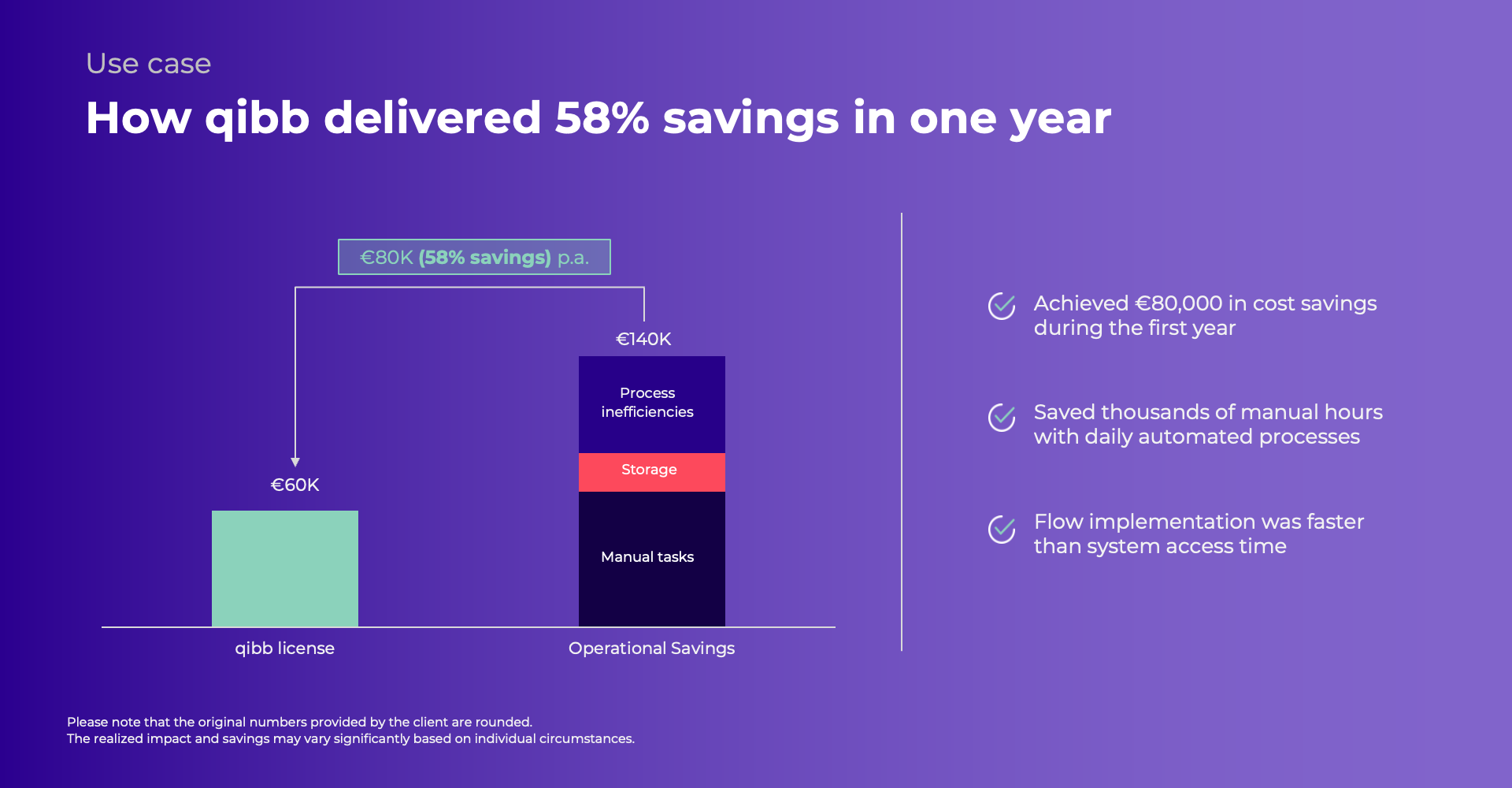Managing digital assets across multiple 24/7 channels is a complex and resource-intensive task, even for broadcasters equipped with advanced cloud-native systems. One of our clients, a European broadcaster, discovered this firsthand. Despite having a sophisticated Media Asset Management (MAM) and playout system, they were still bogged down by manual processes, storage inefficiencies, and quality control challenges that drained time and resources.
Recognizing the need for further optimization, they turned to qibb. By automating key tasks and refining their workflows, qibb enabled the broadcaster to significantly reduce operational costs and improve efficiency. Within just one year, the implementation led to over 80,000 EUR in annual savings, demonstrating the tangible benefits of automation in a real-world broadcasting environment.
Achieving Cost Savings Through Automation
The savings were generated through three primary levers: automating manual housekeeping tasks, reducing storage costs, and resolving process inefficiencies. qibb automated archiving and deleting unnecessary or published assets, tasks that previously required manual intervention. This eliminated tedious work and led to significant storage cost savings by removing unused files and utilizing more cost-effective storage tiers. Additionally, automating quality control tasks, such as managing forbidden characters and file formats, and integrating review and approval processes within standard communication tools, minimized process errors and significantly reduced time to air.

Overall, we categorize the benefits of automation within the media industry into three key areas: eliminating repetitive tasks, optimizing resource utilization, and streamlining processes. qibb’s impact on this broadcaster clearly illustrates the substantial value these improvements can deliver.
Eliminating Repetitive Tasks
In the media industry, production, management, and distribution processes often involve a significant number of repetitive tasks. These tasks typically include copying and pasting metadata between systems, exporting and importing media files, managing content localization, and creating different versions of the same content.
A prime example from our case study is asset housekeeping—such as manually archiving or deleting files—which often occurs multiple times a day, consuming valuable time and resources. However, these processes can be easily automated with straightforward housekeeping rules based on metadata. For instance, rules can be set to automatically archive published projects one day after publication or delete unused scenes or agency wires, significantly reducing the manual workload and streamlining operations.
Optimizing Resource Utilization
The high degree of manual processes in media workflows often results in inefficient use of resources, which can quickly become costly, particularly when dealing with large file sizes. On-premise, this inefficiency can lead to reaching total capacity, necessitating the purchase of additional hardware. In a cloud environment, inefficient usage directly translates into a higher invoice at the end of the month, impacting the bottom line. This issue extends across various resources, whether it’s storage, streaming servers, transcoders, or rendering farms.
For instance, with one of our customers, we automated the ingest streaming channels around sports events based off of broadcast schedules. This orchestration prevents over-utilization that could occur if staff forget to switch off channels, ensuring that resources are only used when needed. An added benefit is the ability to set up dashboards to monitor utilization and costs, providing a clear overview and further optimizing resource management.
Streamlining Processes
A significant source of inefficiency in media workflows stems from idle time, where assets are left waiting at various stages—from ingest approval to being ready for production or final review. Additionally, issues such as missing metadata, corrupt files, and incorrect formats can cause entire processes to stall, leading to delays. These inefficiencies can severely impact time to air, a critical metric in fast-paced environments like news or sports production, and are equally detrimental in post-production scenarios where teams are racing against deadlines.
One effective solution to streamline these processes is the integration of communication tools like Microsoft Teams or Slack. By sending notifications and status updates on assets instantly, these tools accelerate approval workflows and automate quality checks early in the process. This integration significantly reduces idle time and ensures that potential issues are addressed promptly, leading to a faster end-to-end process duration. An additional bonus for utilizing these pre-existing tools is lowered training burden and increased user adoption.
Embracing Automation for Tangible Results
The implementation of qibb illustrates the substantial impact integration and automation can have on operational efficiency. By automating repetitive tasks, optimizing resource use, and streamlining processes, qibb helped the broadcaster save over 80,000 EUR annually within just one year. This success story not only highlights the transformative power of workflow automation but also serves as a call to action for other broadcasters. Imagine what automation could achieve for your operations—explore how qibb can unlock new efficiencies and cost savings for your organization today.


